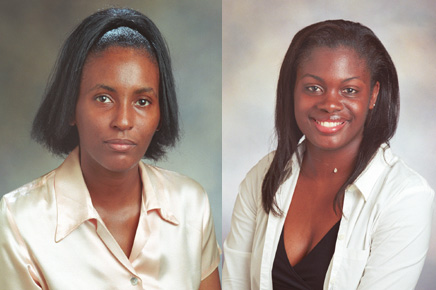Contact: Maridith Geuder

Barbara A. Patrick (left) and April L. Butler
Two doctoral students at Mississippi State are receiving major university fellowships from the Atlanta-based Southern Regional Education Board.
April L. Butler of Wesson and Barbara A. Patrick of Kosciusko are recent selections for the three-year awards that cover tuition costs and provide $12,000 annually to support their advanced academic work.
Butler, a 1999 graduate of Wesson High School and a 2003 Tougaloo College graduate, is seeking a doctorate in computer science. Patrick, a 1997 Ethel High School graduate and 2001 graduate of Rust College, is seeking a doctorate in public policy and administration.
The nonprofit SREB works with educational agencies and institutions in 16 states from Texas to Delaware. Its doctoral fellowship program seeks to increase the number of minority faculty in the region by encouraging ethnic minorities to pursue doctoral degrees and become college-level teachers.
Butler, whose interests include artificial intelligence and computer security, said she plans a teaching career, "preferably in Mississippi." Her primary interest is "the logic behind computer science," she added.
A Ronald E. McNair Scholar at Tougaloo, Butler was president of the campus computer science club and a president's and dean's scholar. She is the daughter of Anna L. Butler and Dan S. McGrew of Hazlehurst and Willie F. Butler of Wesson.
Patrick is a summa cum laude graduate and former student body president at Rust who also has a goal of becoming a college professor. "I'm also interested in the long-term possibility of becoming involved in state politics," she said, noting that she has a particular interest in the area of education and education policy.
"As a state, Mississippi needs to make this one of our priorities for the future," Patrick said. "A degree from Mississippi State will provide the tools for me to help tackle some of these issues."
Patrick is the daughter of Mr. and Mrs. Roosevelt Truss of Kosciusko.
The Southern Regional Education Board is the nation's first interstate compact for education. Created in 1948, the organization is supported by appropriations from member states, as well as by funds from private companies, foundations, and state and federal agencies.